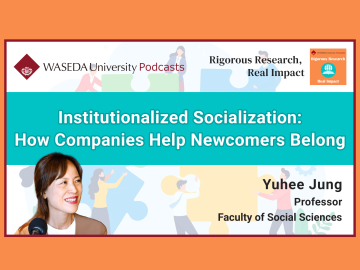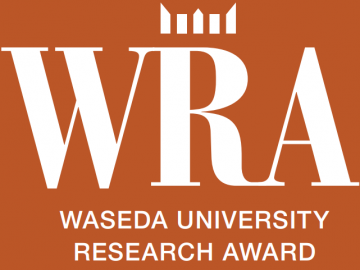Waseda University established the Waseda Research Award in 2014 to promote innovative research at the university and disseminate its results around the world. The award honors scholars spearheading large-scale research projects, as well as emerging researchers whose work has had significant impact abroad. The award has two categories: Large-Scale Research Project and High-Impact Publication. Recipients of the award receive a certificate and a prize of 500,000 yen for the large-scale research project catgory, and 300,000 yen for the high-impact publication category.
Below, we proudly present the recipients of the 2022 Waseda Research Award.
Recipients of the 2022 Waseda Research Award
Large-Scale Research Project Category
*in alphabetical order
- Tetsuya KAWANISHI
R&D on THz wireless communications for massive mobile and long haul applications - Shigeki SUGANO
AIREC: Smart Robot that is Close to One Person for a Lifetime - Haruko TAKEYAMA
Construction of circulating production platform by environmental control based on Soil Microbe Atlas
High-Impact Publication Category
*in alphabetical order
Hiroyasu KIMIZUKA
Non-French scholars working on the history of Ancien Régime France can be found around the world, yet Hiroyasu Kimizuka stands out on multiple fronts. By focusing on maritime activities along the Brittany coast in the eighteenth century, Kimizuka has drawn a vivid portrait of shipmasters, merchants, seafarers, and other mercantile actors in the region. Likewise, his recent works on the ports of Lorient and Concarneau are a part of a steady stream of publications that help shed light on regional trade, economic modernization, and the emergence of the so-called Atlantic world.
Kimizuka’s work is textually empirical, meticulous, and technically sound, which reflects his craftsman-like devotion to doing difficult archival work. He has clearly not shied away from getting his hands dirty, as it were, in the local archives and painstakingly sifting through primary documents.
This is the hallmark of a historian who is dedicated to his craft. One reason why such archival research is daunting is because the hard work it entails does not always pay off.
Thankfully, that is not the case here, as Kimizuka’s piece of regional history can be connected to larger themes and issues in the field.
His findings should contribute to our understanding not only of regional French history, but of a much broader Atlantic history as well as a burgeoning overseas French empire. His work suggests how what seems like small-scale provincial commerce was, in fact, embedded in an emerging global trade network that stretched well beyond the immediate setting of Brittany. Moving forward, we expect Kimizuka to fully inject his site-specific studies into broader interpretive debates in his field, especially regarding the tension between internal locality and external expansionism in late Ancien Régime France.
Another reason why Kimizuka is a deserving recipient of the Waseda Research Award is his ability to disseminate his work in French. Non-French scholars of French history tend to publish mostly in their own language, but not so with Kimizuka. By writing extensively in French, including his doctoral dissertation from the University of South Brittany and a full-length monograph, he is able to speak to a larger global audience and make his contributions known more extensively. Furthermore, Kimizuka has succeeded in establishing fruitful partnerships with scholars in France and beyond, which is not always a given for historians.
As one expert noted, “Kimizuka is, in a sense, a local.” For a Japanese scholar of France, this is very high praise indeed.
Kimizuka’s work helps elevate the stature of Japanese scholars within the global French studies community; Waseda should be proud to call Kimizuka one of its own.
Anantharaj SENGENI
Dr. Anantharaj Sengeni’s research mainly focuses on electrochemical water splitting, a promising technology for hydrogen production. He studies fundamental mechanism and methodologies that are the basic pillars for establishing new paradigms and succeeding in transformational research. He has established the standards for measuring the electrocatalytic activities and the role of several metals for water splitting electrocatalysis. He has conducted many international collaborations with researchers outside Japan, and his works have been published in a number of top journals in the fields of electrochemistry and materials chemistry. In addition to the high-impact original research works, he has published many perspectives and reviews that have been well cited and read in the international community. Recently, he was selected as a “Highly cited author 2021 (for publishing research in the top 5% of highly cited works from Japanese institutions)” by Royal Society of Chemistry. He has also given many lectures to specialist and non-specialist audience. Dr. Sengeni’s work will be applied to many fields beyond water splitting electrocatalysis and surely have noteworthy social impacts in the future as they are directly related to the ambitious transition into hydrogen economy and net-zero CO2 emission by the global society.
Akihiro TAKEZAWA
Focusing his highly creative research on computational mechanics and structural optimization, Professor Akihiro Takezawa has made major contributions to the development of additive manufacturing, an increasingly important field for the real-world implementation of topology optimization. In a field traditionally dominated by experimental approaches, Professor Takezawa has developed innovative, cutting-edge methodology, for instance using theoretical methods to elucidate residual deformation, leading to revolutionary results. His work has been recognized by numerous Japanese and international prizes, including the MEXT Young Scientists’ Award. In the past several years he has published and been cited at a rate far exceeding most researchers his age, including numerous English-language papers with international co-authors. His prominent international presence, including his proactive work in inviting overseas researchers to the university and his membership on the executive committees of international conferences on structural optimization, deserves mention. Professor Takezawa’s achievements contribute to the advancement of industrial manufacturing technology and will likely have an increasingly significant societal impact in the years to come.
Takumi UCHIHARA
Professor Takumi Uchihara has made outstanding contributions to the field of applied linguistics. His research focuses on second language vocabulary acquisition, and in addition to using standard analysis methods, he takes the unique approach of adopting diverse methods according to what is most appropriate for the subject at hand, from interventional studies to meta-analysis. His papers are highly regarded internationally; all his papers in the past five years have been published in top journals of applied linguistics, and his citation numbers are extremely high for humanities research. His international academic standing is evident in his membership on the editorial advisory board of TESOL Quarterly, a top journal in the field, and other achievements. He frequently collaborates with researchers in Japan and around the world, and his future engagement in joint research and the development of international networks holds great promise. His commitment to delivering societal benefits from his research through frequent outreach activities suggests that his work has significant public impact. His track record of producing research of superior quality and originality places him among the global leaders in his field.








